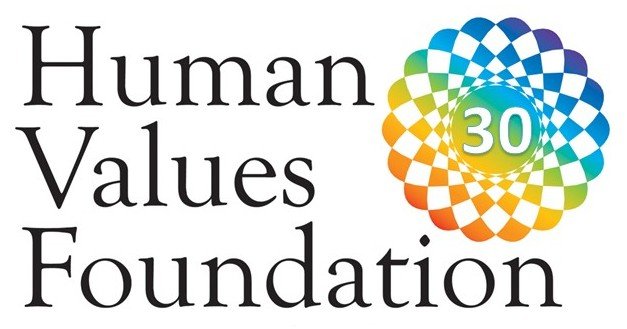Values are universal
The Human Values Foundation (HVF) supplies materials helping to embed a positive values culture in schools. It was formed in 1995 to encourage, promote and develop human values among young people through its educational programmes, publications, exhibitions, conferences and staff exploration sessions. The HVF is a non-denominational and independent body, which does not represent or work on behalf of any particular religion or spiritual interest
The Five Values
At the heart of the HVF’s publications are five principal values. The original five values were love, truth, peace, non-violence and right conduct. In 2019 the values of non-violence and right conduct were updated to community and responsibility. This change was made to reflect the subtle shifts in language and meaning since the charity first started, and feel more appropriate to children’s lives today.
These five principal values form the theme for each dialogic lesson in THE BIG 5 programme for ages 5 to 11 and the accompanying activities and are expanded upon by a series of related values. For example, Honesty as an aspect of Truth; Compassion as an expression of Love; Contentment as form of Peace; Courage as an example of Responsibility; and Appreciation of other cultures as a demonstration of Community. Central to THE BIG 3 + ME programme for ages 3 to 5 are the uplifting, universal values of Peace, Truth and Love.
Introducing The Big Think suite of programmes
Our new, digitised values education programme, The Big 5, was launched in 2019 for children aged 5 to 11 years. The material was based on 25 years of experience of developing and working with our original Education in Human Values (EHV for ages 5 to 11) and Social and Emotional Education (SEE for ages 12 to 14) programmes. The Big 3 + Me research-informed programme followed in 2023. It helps to reduce pre-school education inequality and ensure all children, whatever their social backgrounds, are better prepared for primary schooling from their 5th birthdays.
Education in Human Values (EHV), suitable for primary school children aged from 5 to 11 years.
EHV was an innovative series of empowering Lesson Plans based on five universal core values, 5 of which transcended religious and cultural differences. It was a user-friendly resource pack, suitable for assemblies and classwork. Cross-curricular in its approach, some elements of the EHV programme focused on tranquillity, encouraging children to develop calmness, whereas other aspects helped them build up assertiveness and self-esteem. It opened the way for children to discover, explore, practise and imbibe lasting values, which they could readily apply in school, at home and in their wider communities, all the while enabling them to grow and flourish. More than 2,000 schools in the UK and around the world found this deeply researched and clear approach to values education to be a long sought-after answer to seemingly insoluble problems facing our society.
“Within a few terms we turned the school around completely. The atmosphere became much more positive. Staff, pupils and parents were working together as a team. Behaviour and attendance improved and as a result academic progress accelerated. The school became a place where we all wanted to be.”
Social and Emotional Education (SEE), suitable for young people aged 12 to 14+.
This resource helped students develop a healthy lifestyle, good relationships, a caring attitude, confidence and responsibility. The core values of Truth, Love, Peace, Right Action and Non-Violence, together with over 70 related values, which were essential components of the EDUCATION IN HUMAN VALUES programme for primary schools, were carried into the SOCIAL AND EMOTIONAL EDUCATION (“SEE”) programme but explored with a more discerning approach for this older age group.
“I have no hesitation in highly recommending Education in Human Values. We think it is excellent. The children enjoy the lessons and find them relevant to their lives. They also enjoy the songs, which act as a strong reinforcement. The teachers like the structured but flexible format. There is a tremendous need for materials like this. Following this scheme can change children’s outlook. If all schools adopted this scheme, we could, in time, change society.”
